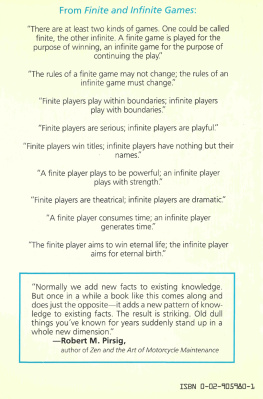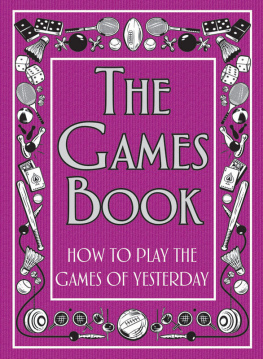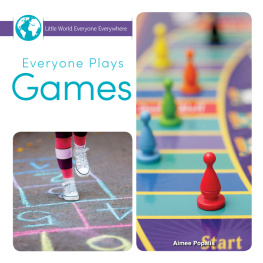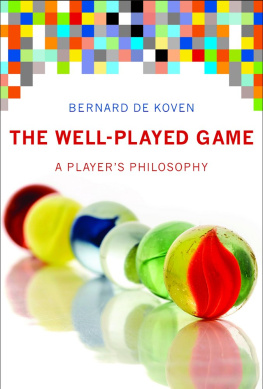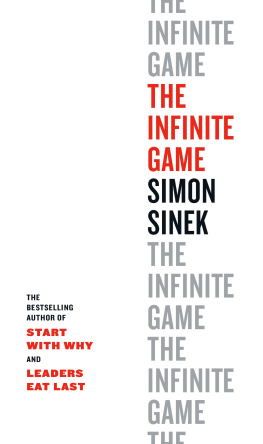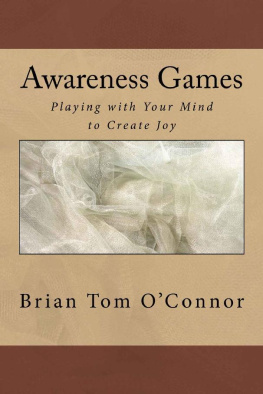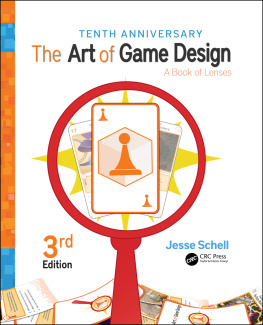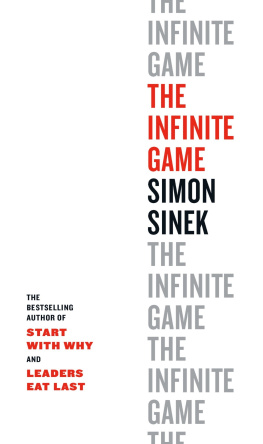
1
THERE ARE at least two kinds of games. One could be called finite, the other infinite.
A finite game is played for the purpose of winning, an infinite game for the purpose of continuing the play.
2
If a finite game is to be won by someone it must come to a definitive end. It will come to an end when someone has won.
We know that someone has won the game when all the players have agreed who among them is the winner. No other condition than the agreement of the players is absolutely required in determining who has won the game.
It may appear that the approval of the spectators, or the referees, is also required in the determination of the winner. However, it is simply the case that if the players do not agree on a winner, the game has not come to a decisive conclusionand the players have not satisfied the original purpose of playing. Even if they are carried from the field and forcibly blocked from further play, they will not consider the game ended.
Suppose the players all agree, but the spectators and the referees do not. Unless the players can be persuaded that their agreement was mistaken, they will not resume the playindeed, they cannot resume the play. We cannot imagine players returning to the field and truly playing if they are convinced the game is over.
There is no finite game unless the players freely choose to play it. No one can play who is forced to play.
It is an invariable principle of all play, finite and infinite, that whoever plays, plays freely. Whoever must play, cannot play.
3
Just as it is essential for a finite game to have a definitive ending, it must also have a precise beginning. Therefore, we can speak of finite games as having temporal boundariesto which, of course, all players must agree. But players must agree to the establishment of spatial and numerical boundaries as well. That is, the game must be played within a marked area, and with specified players.
Spatial boundaries are evident in every finite conflict, from the simplest board and court games to world wars. The opponents in World War II agreed not to bomb Heidelberg and Paris and declared Switzerland outside the boundaries of conflict. When unnecessary and excessive damage is inflicted by one of the sides in warfare, a question arises as to the legitimacy of the victory that side may claim, even whether it has been a war at all and not simply gratuitous unwarranted violence. When Sherman burned his way from Atlanta to the sea, he so ignored the sense of spatial limitation that for many persons the war was not legitimately won by the Union Army, and has in fact never been concluded.
Numerical boundaries take many forms but are always applied in finite games. Persons are selected for finite play. It is the case that we cannot play if we must play, but it is also the case that we cannot play alone. Thus, in every case, we must find an opponent, and in most cases teammates, who are willing to join in play with us. Not everyone who wishes to do so may play for, or against, the New York Yankees. Neither may they be electricians or agronomists by individual choice, without the approval of their potential colleagues and competitors.
Because finite players cannot select themselves for play, there is never a time when they cannot be removed from the game, or when the other contestants cannot refuse to play with them. The license never belongs to the licensed, nor the commission to the officer.
What is preserved by the constancy of numerical boundaries, of course, is the possibility that all contestants can agree on an eventual winner. Whenever persons may walk on or off the field of play as they wish, there is such a confusion of participants that none can emerge as a clear victor. Who, for example, won the French Revolution?
4
To have such boundaries means that the date, place, and membership of each finite game are externally defined. When we say of a particular contest that it began on September 1, 1939, we are speaking from the perspective of world time; that is, from the perspective of what happened before the beginning of the conflict and what would happen after its conclusion. So also with place and membership. A game is played in that place, with those persons.
The world is elaborately marked by boundaries of contest, its people finely classified as to their eligibilities.
5
Only one person or team can win a finite game, but the other contestants may well be ranked at the conclusion of play.
Not everyone can be a corporation president, although some who have competed for that prize may be vice presidents or district managers.
There are many games we enter not expecting to win, but in which we nonetheless compete for the highest possible ranking.
6
In one respect, but only one, an infinite game is identical to a finite game: Of infinite players we can also say that if they play they play freely; if they must play, they cannot play.
Otherwise, infinite and finite play stand in the sharpest possible contrast.
Infinite players cannot say when their game began, nor do they care. They do not care for the reason that their game is not bounded by time. Indeed, the only purpose of the game is to prevent it from coming to an end, to keep everyone in play.
There are no spatial or numerical boundaries to an infinite game. No world is marked with the barriers of infinite play, and there is no question of eligibility since anyone who wishes may play an infinite game.
While finite games are externally defined, infinite games are internally defined. The time of an infinite game is not world time, but time created within the play itself. Since each play of an infinite game eliminates boundaries, it opens to players a new horizon of time.
For this reason it is impossible to say how long an infinite game has been played, or even can be played, since duration can be measured only externally to that which endures. It is also impossible to say in which world an infinite game is played, though there can be any number of worlds within an infinite game.
7
Finite games can be played within an infinite game, but an infinite game cannot be played within a finite game.
Infinite players regard their wins and losses in whatever finite games they play as but moments in continuing play.
8
If finite games must be externally bounded by time, space, and number, they must also have internal limitations on what the players can do to and with each other. To agree on internal limitations is to establish rules of play.
The rules will be different for each finite game. It is, in fact, by knowing what the rules are that we know what the game is.
What the rules establish is a range of limitations on the players: each player must, for example, start behind the white line, or have all debts paid by the end of the month, charge patients no more than they can reasonably afford, or drive in the right lane.
In the narrowest sense rules are not laws; they do not mandate specific behavior, but only restrain the freedom of the players, allowing considerable room for choice within those restraints.
If these restraints are not observed, the outcome of the game is directly threatened. The rules of a finite game are the contractual terms by which the players can agree who has won.
9
The rules must be published prior to play, and the players must agree to them before play begins.
Next page
